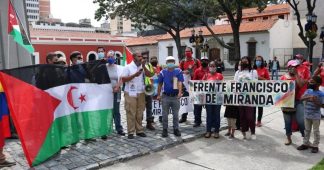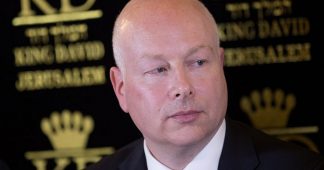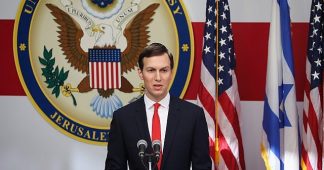Scoop: Fallout between Trump and top GOP senator made Morocco-Israel deal possible
By Barak Ravid,
Dec. 11, 2020
A fallout between President Trump and Sen. Jim Inhofe (R-Okla.), chairman of the Senate Armed Services Committee, led to the breakthrough that resulted in the Morocco-Israel normalization deal, sources briefed on the matter told me.
Why it matters: Inhofe is Washington’s most avid supporter of the Polisario Front — a Sahrawi rebel national liberation movement aiming to end Moroccan occupation of the Western Sahara. He has travelled many times to Algeria for meetings with Polisario leaders.
- Inhofe is one of Trump’s closest allies in the Senate and has asked the president over the last two years not to recognize Moroccan sovereignty in the Western Sahara.
Behind the scenes: Trump’s senior adviser Jared Kushner and special envoy Avi Berkowitz have been speaking with the Moroccan government for more than two years about the possibility of normalizing relations with Israel in exchange for recognition of the Western Sahara.
- The original idea came from a group of former Israeli officials led by ex-Mossad deputy director Ram Ben Barak. His company has done business in Morocco with Yariv Elbaz, a Moroccan Jew who is one of the main food retailers in Morocco and a close associate of Moroccan foreign minister Nasser Bourita.
- In 2018, Ben Barak and Elbaz spoke to both Netanyahu’s national security advisers, former U.S. special envoy Jason Greenblatt and Bourita, and raised the idea of a Western Sahara-for-Israeli-normalization deal. The initiative didn’t make any progress, but a connection was created between Elbaz and Netanyahu’s aides, as well as Elbaz and the White House — namely Jared Kushner.
- In May 2019, Elbaz met with Kushner in Morocco and took him and the entire White House “peace team” for a visit at the old Jewish cemetery in Casablanca.
Kushner met during the visit with King Mohammed VI, who raised the issue of U.S. recognition of the Western Sahara. This meeting made clear to the White House how important the issue was to the Moroccans.
- After the visit, a direct channel was created between Kushner’s team and Moroccan foreign minister Bourita. The Moroccan foreign minister visited the White House several weeks later to follow up on the talks.
- Bourita had separate meetings with Kushner and with Ivanka Trump, raising the Western Sahara issue in both. Kushner decided to push forward with the initiative after Bourita’s visit.
- The Israeli government encouraged the White House several times in the last two years to pursue this track in the hopes that it could lead the Moroccans to agree to normalize relations.
Kushner, Berkowitz and Bourita effectively reached a deal a little more than a year ago, but Inhofe joined with then-national security adviser John Bolton to vehemently oppose it. Trump, who was close to Inhofe and needed his political support, agreed not to move forward with the deal.
Driving the news: Relations between Trump and Inhofe soured about a week ago over the National Defense Authorization Act, a key military funding bill that Congress has passed every year since 1961, sources who were involved in the matter told me.
- Trump wanted Inhofe to include provisions in the bill to repeal protections for social media companies and to kill a provision to rename military installations that carry names of Confederate leaders.
- Inhofe rejected both demands and, as Axios’ Alayna Treene reported, the two had a difficult phone call in which Inhofe leveled with Trump and said: “This is the only chance to get our bill passed.”
- An angry Trump went to his Twitter account to hit back at Inhofe, claiming his position would harm U.S. national security and election integrity and reiterating his threat to veto the bill.
Sources who were briefed on the matter told me Trump’s chief of staff Mark Meadows, Kushner and Berkowitz saw this as an opening to get the Morocco deal done.
- They raised the issue with President Trump and he gave them a green light. They then checked with the Moroccans to see whether they were still interested in the deal from last year. The Moroccans said yes.
- Surprisingly, Israeli Prime Minister Netanyahu wasn’t all that happy. An Israeli official told me Netanyahu didn’t like part of the language in the statement the Moroccans were going to issue and was upset he would not be participating in the phone call between Trump and the king of Morocco. Netanyahu’s office denied to Axios that he was upset.
- Another person who wasn’t happy was Inhofe. After the announcement of the deal on Thursday, Inhofe spoke on the Senate floor and called the White House’s decision “shocking and deeply disappointing.” He added that he was “saddened that the rights of the Western Sahara people have been traded away.”
The big picture: Western Sahara is a sparsely populated, disputed territory that borders Morocco on the northwest corner of Africa.
- It was formerly controlled by Spain and is now claimed by Morocco despite international opposition and fierce resistance from the indigenous population.
- A violent insurgency ended in 1991 after 16 years, but the matter remains unresolved. Several weeks ago, fighting erupted again between the Moroccan army and Sahrawi rebels.
Published at www.axios.com











